Long Form vs Short Form for SEO — Does Length Matter?
Feb 18, 2025
Written by Casey Bjorkdahl

Casey Bjorkdahl is one of the pioneering thought leaders in the SEO community. In 2010, Casey co-founded Vazoola after working for a Digital Marketing Agency for five years in New York City. Vazoola is now one of the fastest growing and most widely recognized SEO marketing firms in the country.
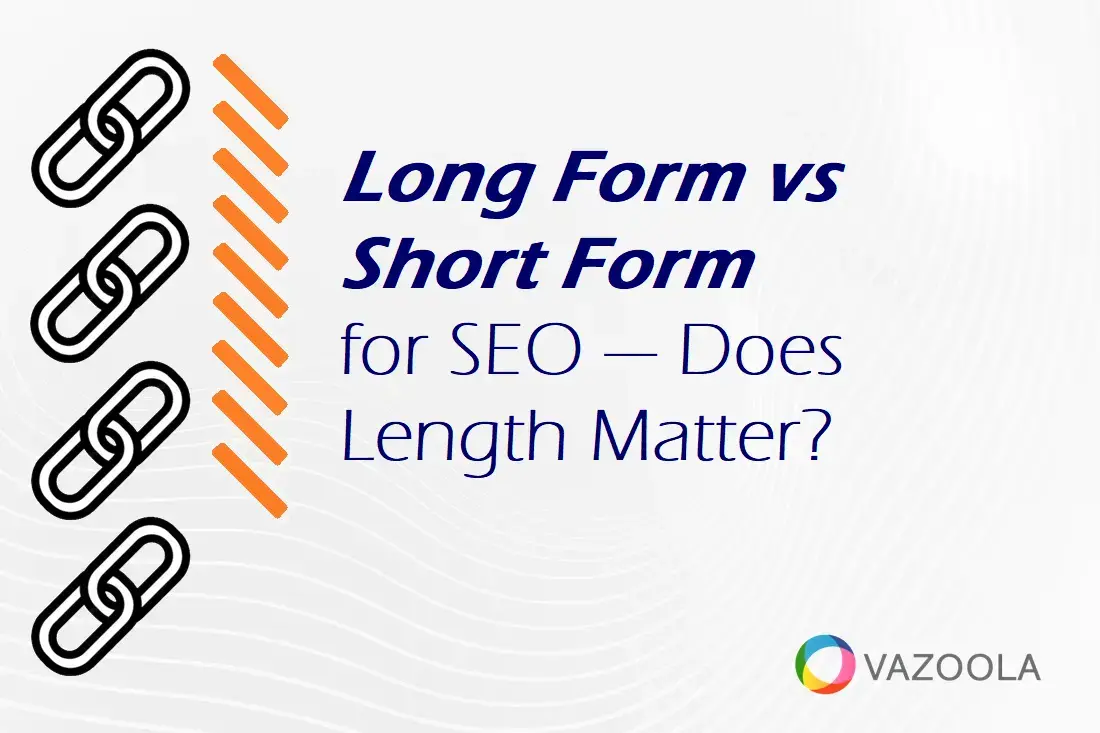
How long should content be? Just how many words should a blog post, for example, be for SEO?
It's the question on every marketer's, content creator's, and entrepreneur's mind: Is longer content always better, or is there room for short-form content within a successful SEO strategy?
While quality tops everything, realizing strengths and weaknesses for both content types can help in designing your approach accordingly to maximize your impact.
Knowing what type of content to use, long or short form, will maximize your short and long-form content marketing game, meeting the user's needs and your SEO goals head-on.
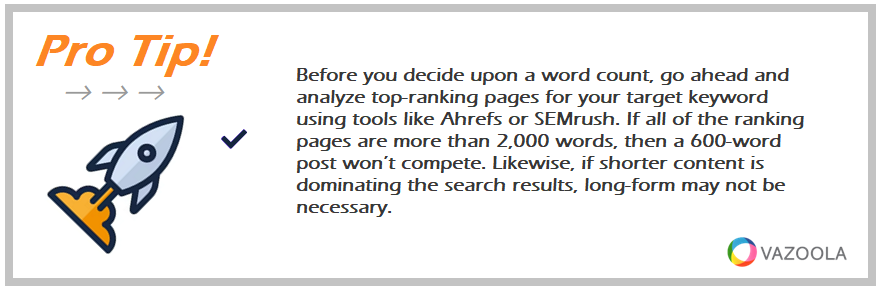
Before you decide upon a word count, go ahead and analyze top-ranking pages for your target keyword using tools like Ahrefs or SEMrush. If all of the ranking pages are more than 2,000 words, then a 600-word post won’t compete. Likewise, if shorter content is dominating the search results, long-form may not be necessary.
Key Takeaways:
-
Both long-form work and short-form work have advantages and disadvantages.
-
The ideal content length SEO depends on the goal, audience, and topic complexity.
-
Short-form content is best for quick, digestible information, whereas long-form copy allows for more in-depth coverage.
-
Studies show that long-form content often ranks better, but quality and user intent matter more than word count.
-
Google has no strict word count rule, but the search giant prefers comprehensive and useful content.
Table of Contents:
What Does Short-Form Content Mean?
But first, what is short-form content? In other words, what’s the short-form content definition?
Well, it's pretty straightforward. Short-form content generally means articles, blog posts, videos, and even social media updates that run under 1,000 words. It targets those users in a hurry for some quick information or immediate answers.
Indeed, the format is for quick consumption. It’s used, most of the time, in short-form content examples like:
-
Social media updates (X, LinkedIn posts)
-
Email newsletters
-
Short blog posts (300-600 words)
-
Product descriptions
-
Brief explainer videos
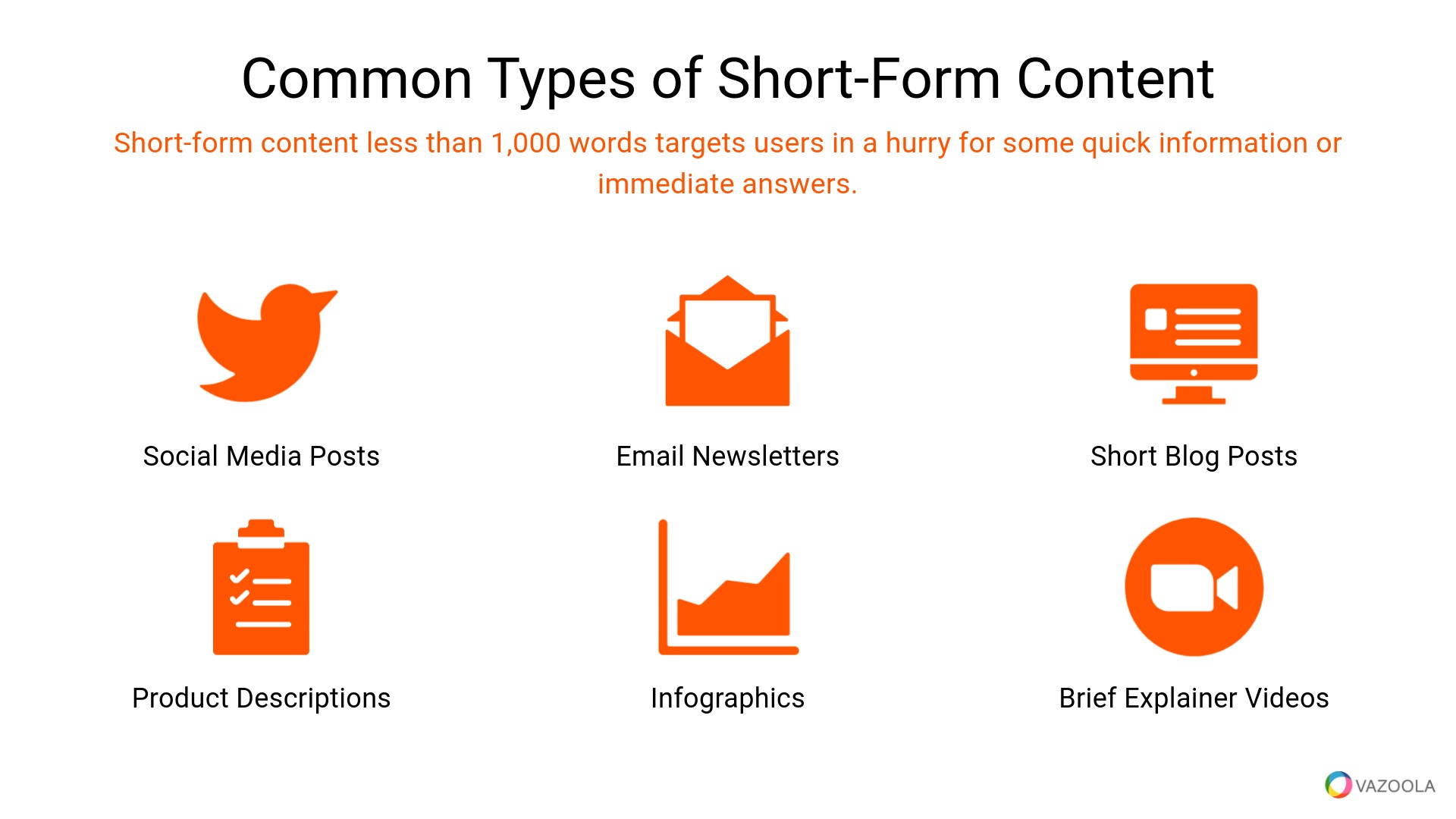
Benefits of Short-Form Content
It has a number of benefits – from being easily consumed to being cost-effective, among many others.
Easier to Consume
Short-form content fits in well with the modern attention span. For mobile users – or anyone in general who wants some quick insights – it's perfect.
Cost-Effective
Fewer words = less time spent = less money invested. Smaller pieces can be created and published on a more regular basis.
Higher Engagement
Quick reads are much more likely to be shared over social media, thus driving traffic and engagement.
Effective for Specific Purposes
Short format content goes well to announce any news, introduce any product, or declare any significant information.
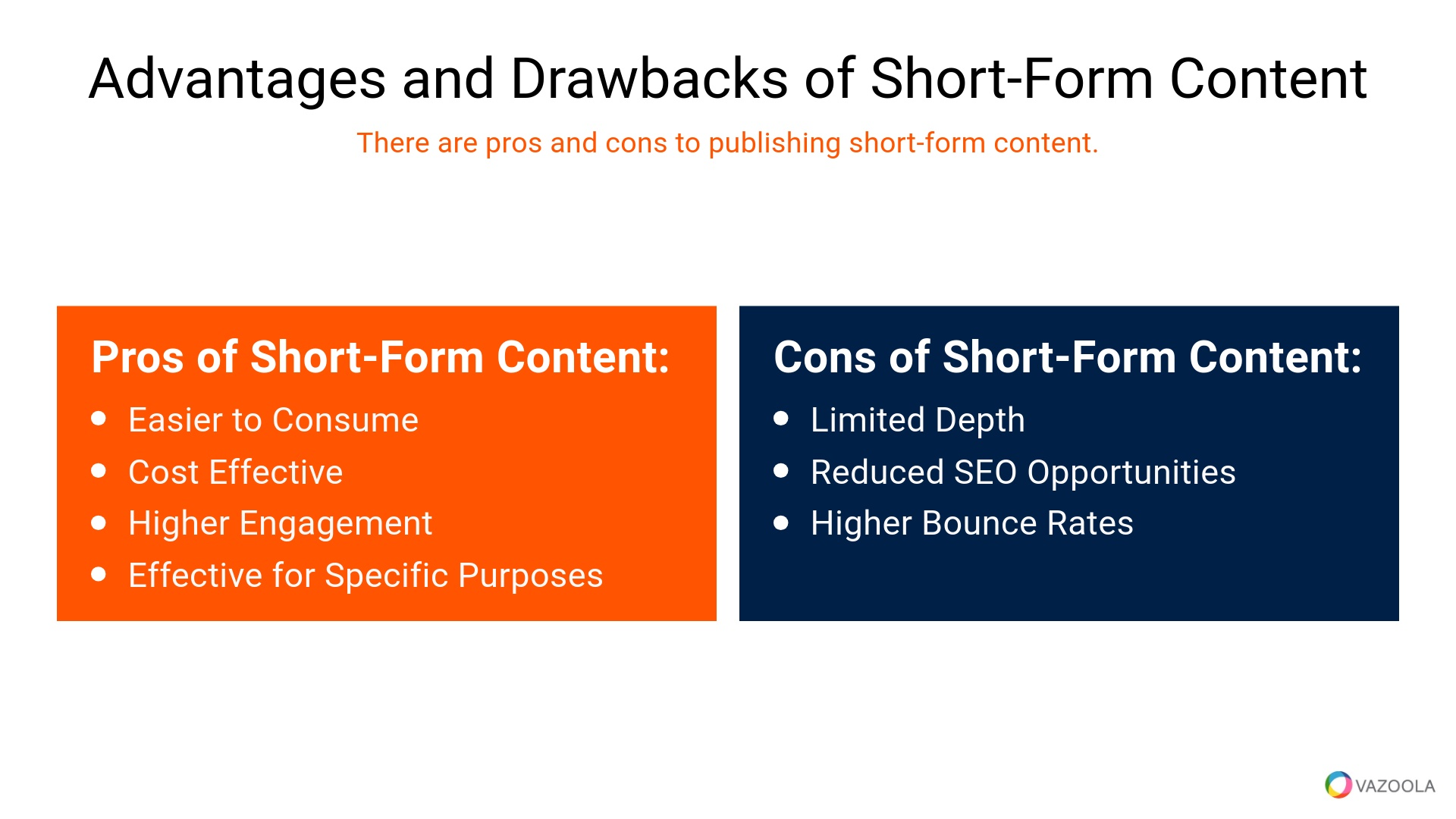
Disadvantages of Short-Form Content
While short-form content has its advantages, it also comes with disadvantages.
Limited Depth
Shorter articles can't give in-depth information. This can reduce your authority on detailed and complex topics.
Reduced SEO Opportunities
Less word count means fewer opportunities to include keywords and internal links naturally.
Higher Bounce Rates
If they cannot find the detailed content, visitors leave quickly.
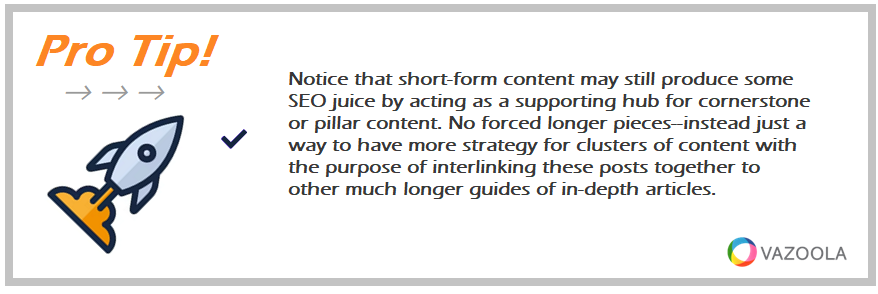
Notice that short-form content may still produce some SEO juice by acting as a supporting hub for cornerstone or pillar content. No forced longer pieces--instead just a way to have more strategy for clusters of content with the purpose of interlinking these posts together to other much longer guides of in-depth articles.
What Does Long-Form Content Mean?
Long-form content serves readers looking for thorough analysis and detailed information. But what is the long-form content definition? What is long form content?
Long-form content generally exceeds 1,000 words. It takes a deeper dive into topics. A few options for long-form content examples include:
-
In-depth long-form blog posts (1,200+ words)
-
E-books
-
Comprehensive guides
-
Whitepapers
-
Case studies
-
Pillar content and resource pages
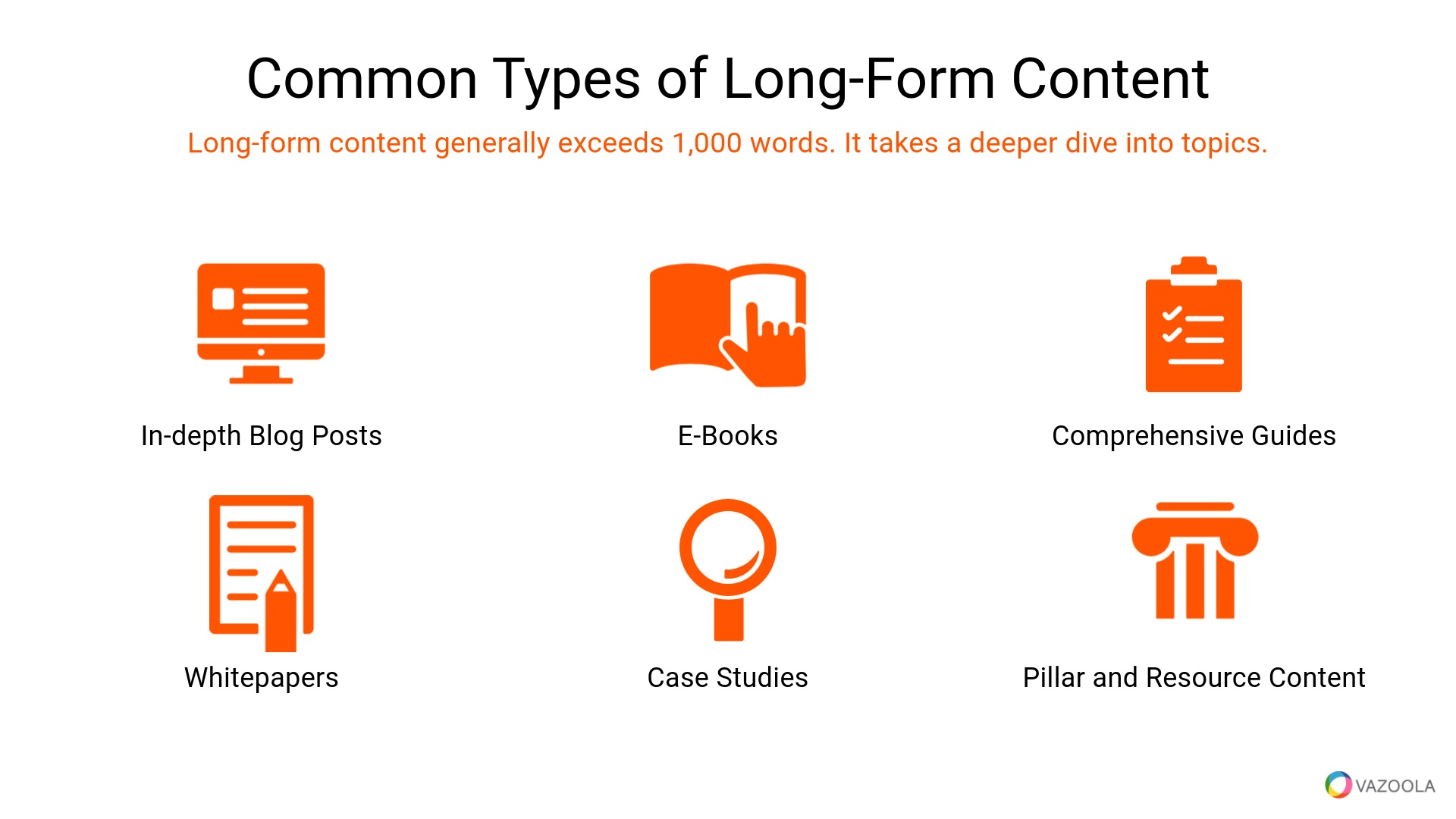
Benefits of Long-Form Content
There are several advantages of long-form work, ranging from better search rankings to higher conversion rates – and revenue!
Improved SEO
Long articles provide more room for keywords and internal links.
Increased Authority
Detailed posts establish expertise and position your brand as an industry leader.
Better Engagement
Users spend more time on the page when it has comprehensive content. That improves dwell time and reduces bounce rates.
Better Conversion Rates
Lengthy content can convince readers, which boosts conversion rates.
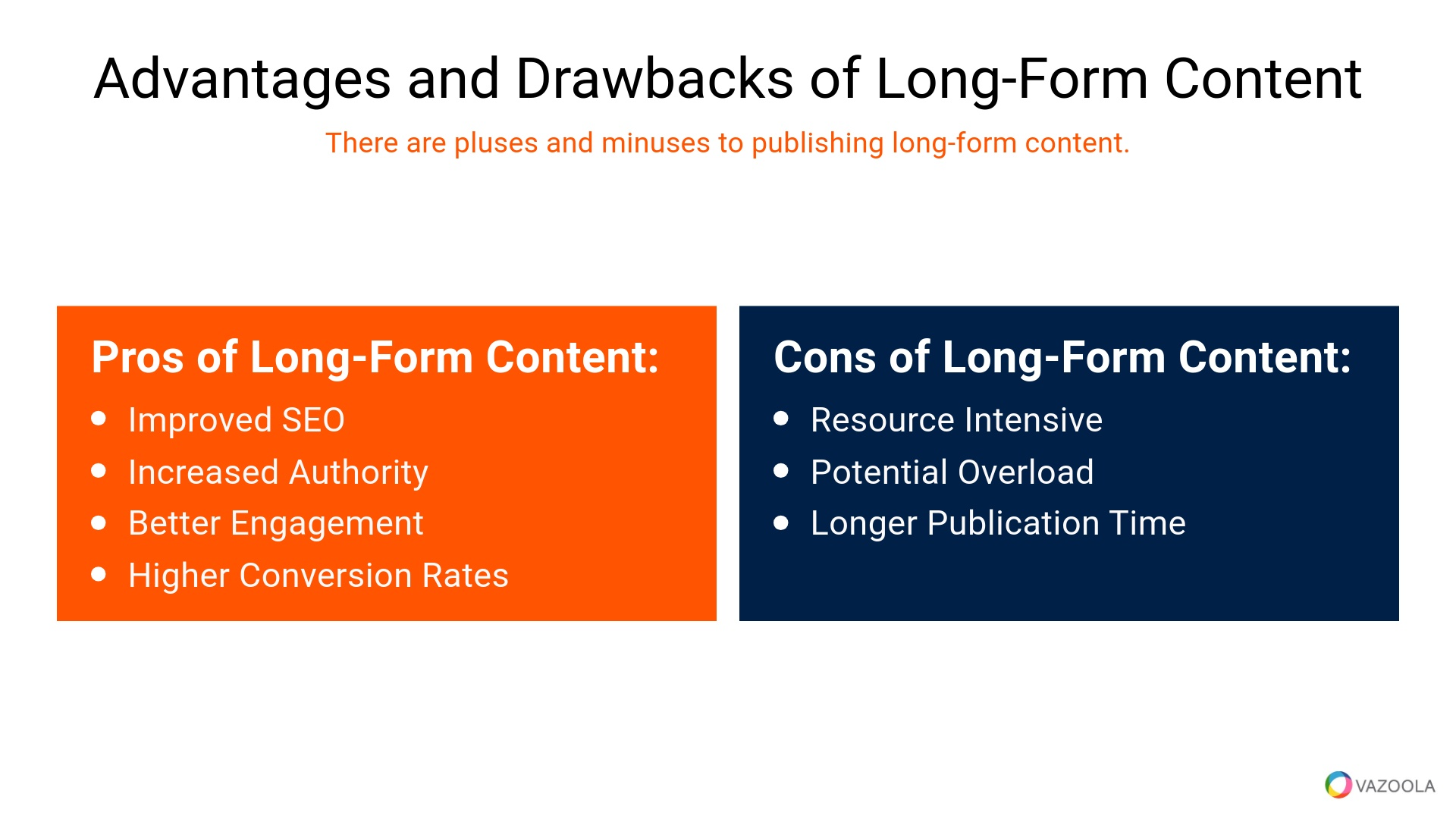
Disadvantages of Long-Form Content
Despite its benefits, long-form content has some downsides.
Resource Intensive
Creating detailed content requires more time, effort, and research.
Potential Overload
Some readers may feel overwhelmed by lengthy posts, preferring concise information.
Longer Publication Time
Producing quality long-form content can slow down your publishing schedule.
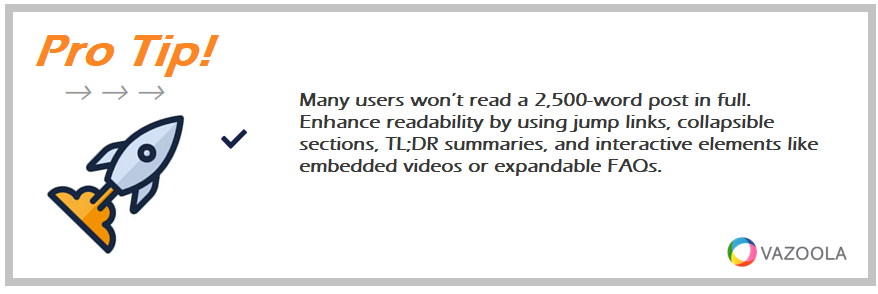
Many users won’t read a 2,500-word post in full. Enhance readability by using jump links, collapsible sections, TL;DR summaries, and interactive elements like embedded videos or expandable FAQs.
What's the Best Content Length?
There’s no single answer to this question. After all, determining your ideal article length SEO depends on things like your goals and audience.
Backlinko research suggests that longer content tends to rank higher, with the average blog post length on the Google first page result containing 1,447 words.
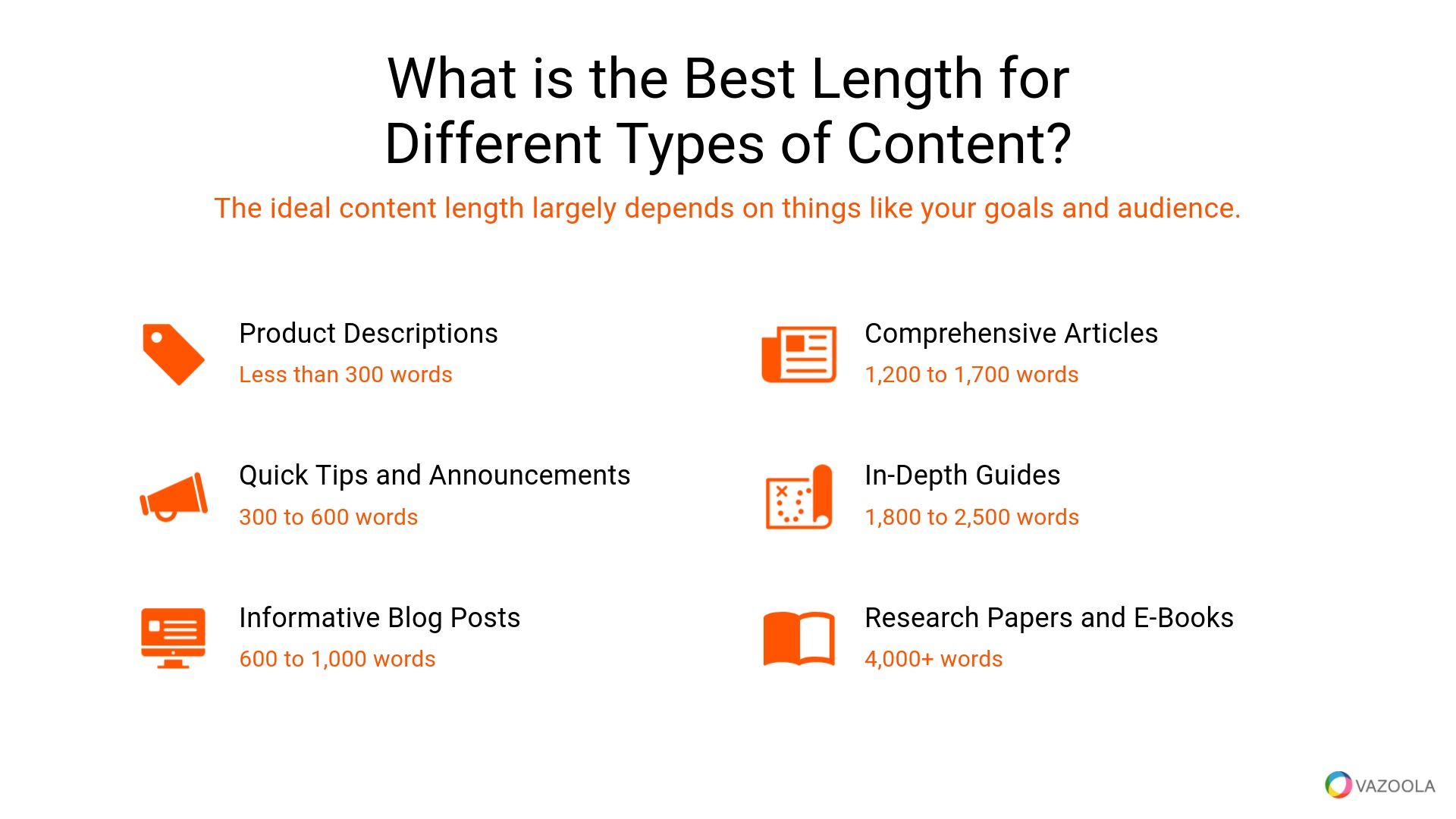
However, length doesn’t tell the whole story. Yoast stresses the importance of content quality and relevance, explaining that they matter more than length alone.
What is the best blog length for SEO? Different types of content benefit most from different lengths:
-
Less than 300 words is ideal for product descriptions.
-
300 to 600 words are suitable for quick tips or announcements.
-
600 to 1,000 words is the best blog post length that works well for informative blog posts.
-
1,200 to 1,700 words is perfect for comprehensive articles.
-
1,800 to 2,500 words are effective for in-depth guides.
-
4,000+ words is best for extensive research papers or e-books.
What's the ideal length for blog posts?
So, what exactly is the ideal blog length, anyway?
Again, finding the ideal blog post length depends on the topic, audience, and goals. There is research to indicate longer posts do better with search rankings, but obviously, engagement and value count far more than raw word count alone.
Backlinko’s own study in 2019 concluded that 1,000-2,000 words is seemingly the "sweet spot" that will maximize one's shares across Facebook, X, Reddit and Pinterest.
Yoast suggests that blog posts should be at least 300 words for search engine optimization purposes, though longer content will provide more opportunities to rank.
Generally speaking, quick insights can be adequately communicated within 600–1,000 words, while in-depth exploration works better when over 1,500 words. The important thing is the relevance and readability of your piece, not just the SEO word count.
What does Google say about word count?
Despite repeated assurances from Google that word count is not a direct ranking factor, it seems that the length of your content can actually impact SEO if that length affects the relevance or user experience.
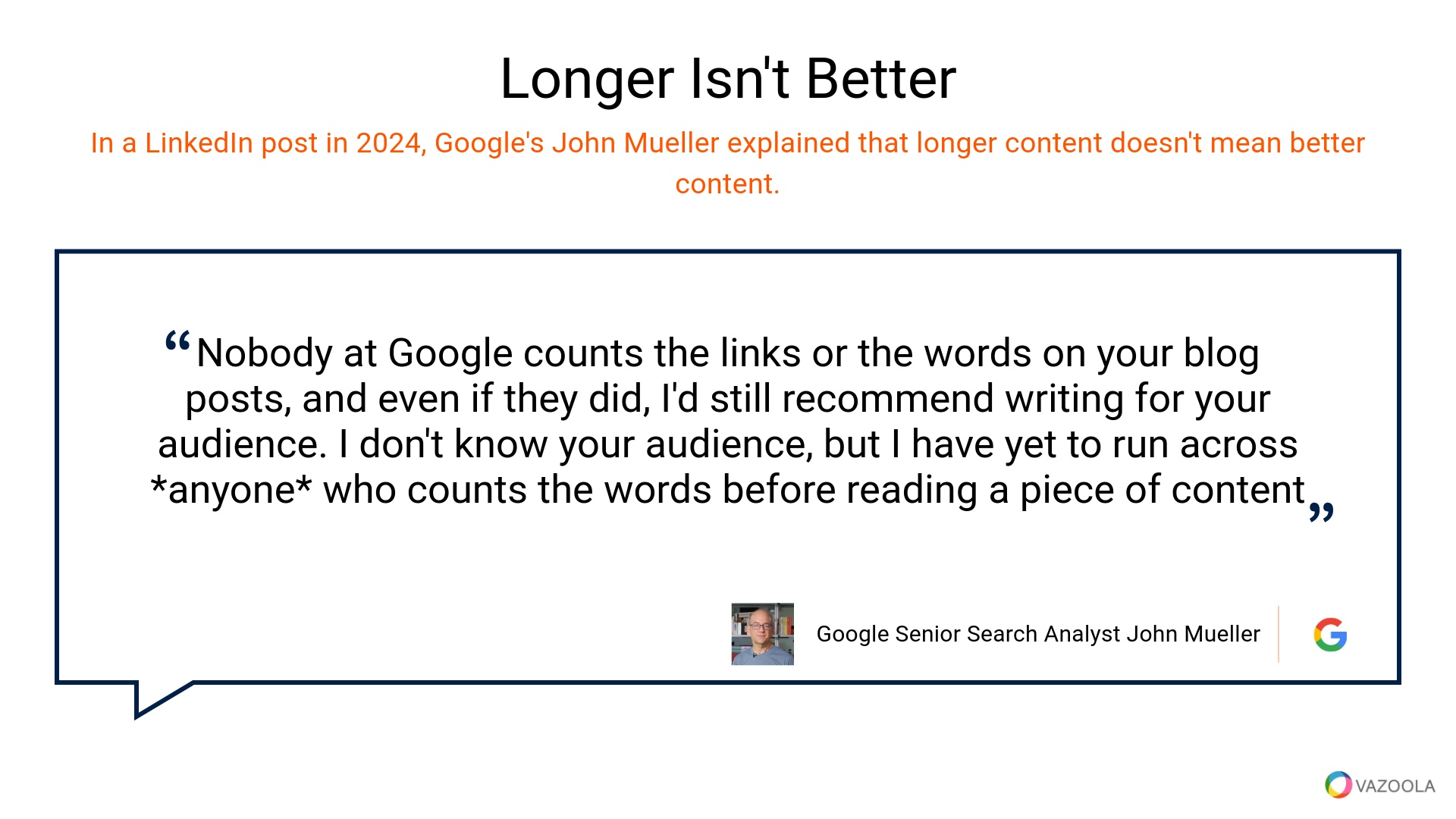
Several of the industry's luminaries have weighed in regarding word count SEO as a ranking factor:
-
As Search Engine Journal explains, Google’s John Mueller has emphasized that longer content isn’t necessarily better, and what really counts is whether the content actually best satisfies user intent.
-
Bruce Clay, a leading search marketing agency, suggests that while there is no minimum word count for SEO rankings, longer content often performs better because it enables more depth, keyword variation, and internal linking.
-
Yoast’s SEO research shows that while blog posts should at least be 300 words to show in search, longer articles often tend to yield better engagement and ranking potential.
-
Search Engine Land says that the ideal word count depends on content quality and user satisfaction, not on meeting a specific numerical target.
-
In 2021, Google's Webmaster Forum clarified that content length alone does not determine ranking, and well-structured, concise pages can still outrank long-form content if they serve the answer better.
The takeaway?
Google doesn't reward length in content for its own sake, but the more well-researched, detailed content tends to rank better since it serves more value to users.
Instead of focusing solely on word count, prioritize clarity, structure, and user intent to boost search rankings.
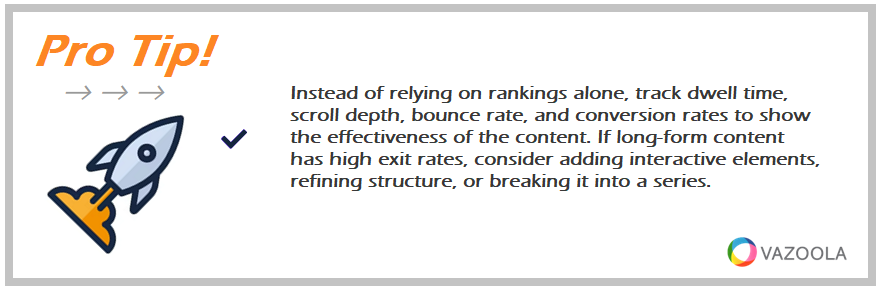
Instead of relying on rankings alone, track dwell time, scroll depth, bounce rate, and conversion rates to show the effectiveness of the content. If long-form content has high exit rates, consider adding interactive elements, refining structure, or breaking it into a series.
Long-Form vs. Short-Form Content
So, which is better? Short form vs. long form content? How long should a blog post be? What about other long form and short form content?
Both long-form and short-form content have a place in a well-rounded SEO strategy.
The right format, therefore, depends on the target audience, goals, and the topic's complexity.
Instead, focus on quality, relevance, and user intent over arbitrary word counts to achieve the best results in search rankings and user engagement.
Now can you answer, “how long should an article be?”
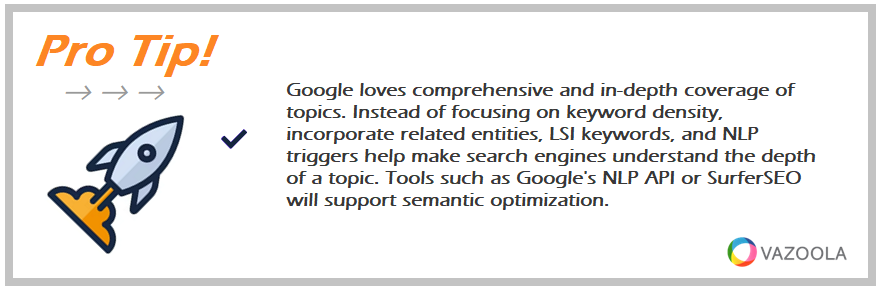
Google loves comprehensive and in-depth coverage of topics. Instead of focusing on keyword density, incorporate related entities, LSI keywords, and NLP triggers help make search engines understand the depth of a topic. Tools such as Google's NLP API or SurferSEO will support semantic optimization.

